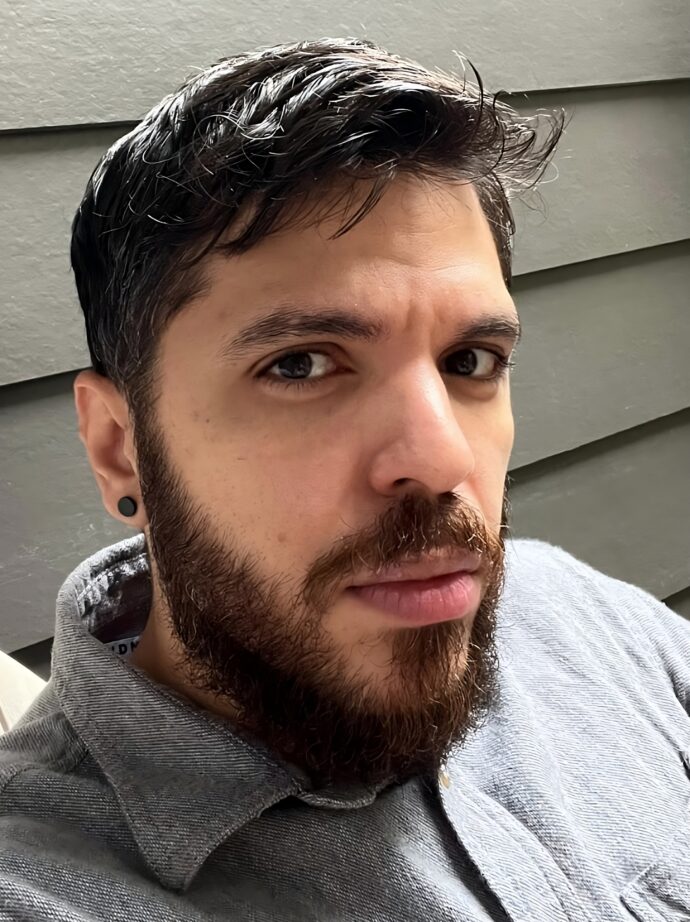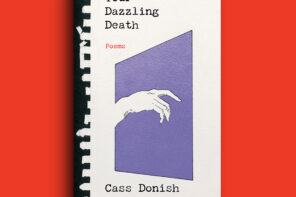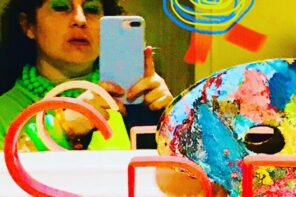There were at least eight of us around the flame tree. I can only remember William and Albert, who lived right below the apartment where I spent half my life. They were born in New York, but moved to Puerto Rico when they were young. William, the older one, spoke English and would correct me whenever I butchered the names of our idols. Like the time he read in one of my notebooks the nickname of my favorite wrestler:
“Dude, Estoncol Tibosty?” he asked, scratching his nose to stifle a laugh.
“Yeah,” I replied defensively. “He’s the bald guy with the vest who’s in a feud with Undertaker… the one who drinks beers when he wins..”
“Nooo, hahaha. Look.”
William grabbed a blue magic marker from on top of the dresser. He wrote the correct name down the length of my forearm.
* * *
I learned about William and Albert almost by accident. They lived below me, and since we were about the same age, it was only a matter of time before we met. Often, I’d play with pharmacy-bought green toy soldiers on my apartment balcony. One day, I thought I spotted a poster of Mankind in the room on the floor below. I pressed my face as close as I could to the lower part of the balcony railings to make sure my eyes weren’t deceiving me. I wasn’t excited about the wrestler himself—he wore a ridiculous outfit: a leather mask, a black tie over a white button-up shirt, and a sock on his right hand—but because I had found a neighbor who was also a wrestling fan.
I spent several afternoons on the balcony, making exaggerated noises and getting bored with my toys. A week later, I saw a head floating near the windows.
“Hey!” I called urgently.
“What’s up, dude?”
“What’s your name?” I added, trying to calm him down a bit.
“Albert…”
“Hmm… is that your poster?”
He nodded and disappeared. A couple of seconds later, he returned with something in both hands.
“Check this out.”
A skinny arm covered in mosquito bites poked through the window. He opened his fist, and I barely made out a red Hot Wheels car that fell into the void, flipping as it went down. The metallic sound was almost imperceptible when it hit the pavement. His laughter, in contrast, rang clearly in my ears. A certain sense of helplessness overwhelmed me. I had always been a sad child. I cried if my mom left me in the car while she paid for gas. I cried when, while in a liquor store, I dropped a malt drink and my mom yelled at me in front of everyone, “¿Tú tienes las manos llenas de mierda?” I cried if I fought at school, even if I was winning.
But there was no time for contemplation with Albert. He immediately said, “Your turn.”
I wasn’t allowed to spit off the balcony or throw trash. But there was the person I’d been looking for since I saw that poster, the promise of a friend, the first challenge of our friendship. I grabbed a forgettable Hot Wheels car and returned.
Albert was waiting, his smile slowly fading. The rest of his face held a mischievous look that, in truth, would never leave him. I stretched my hand between the balcony bars and dropped the toy. Eight floors of free fall. This time, we didn’t hear the toy hit the pavement.
“And the other car? Isn’t it going down too?”
“No. This one’s for you,” he said, throwing it back at me.
* * *
I met William in preschool at the same housing complex. On the first day of class, he arrived holding his mom’s hand. Albert was behind her and approached me, announcing, “You live on the eighth floor, right? Hey, Will, this is the kid from upstairs.”
William came over and said, “Give me five.”
I extended my arm, and he slammed his hand against mine with force. A tingle ran through my fingers, but I didn’t complain.
We became friends instantly. Buddies. Pals. We hung out together at school, even getting into silly arguments about whether Jordan was the best or who we’d want to play house with. We even liked the same girl: a pale girl with almost translucent pink nails named Nicole, who once complimented my socks:
“Those are nice, but they’re old because they’ve got the Green Ranger on them, and now the one that matters is the White Ranger.”
William pushed her on the shoulder and corrected her, “Bitch, the Green Ranger is the same as the White Ranger. You don’t know anything.”
Nicole looked embarrassed but didn’t argue. I think we both liked her for a long time.
We were inseparable. We saw each other every day, talking either from my balcony or from their window, the one with the Mankind poster. Albert was younger, so he didn’t come to school with us yet, but he controlled the conversations.
“And you’re never allowed to come out? Let’s go to the basketball court!”
I stayed quiet because I didn’t have an answer. I knew I wouldn’t be allowed. My mom often pointed out that we lived in a rough place where a shootout could break out at the slightest provocation. She usually made her judgments, then followed them with concrete anecdotes: “Just last week, they shot two people at the gate to the avenue! One got sixteen gunshots, and the other twelve.”
* * *
Sure enough, Mom didn’t let me go out that day. Or the next. From her room, she could see the basketball court and the swings, but eight floors felt insurmountable to let her son roam the world alone. However, she did let them come to our house. I was also allowed to hang out in the hallway and spend the whole afternoon with them. If not, we’d compete on NBA Live or bring out the Fisher Price hoop my mom had given me for my last birthday. We all liked basketball, but I have to admit, they were better than me. Sometimes I managed to score a few points, but it was never enough against the acrobatic layups and mid-range shots with which the brothers would close the game.
Despite everything, there was no resentment over the losses. I was too young to hold grudges or have my pride hurt. Either that, or I was already adopting a losing attitude at a very young age. Even though Will—our affectionate nickname for him—didn’t celebrate his victories, Albert always showed off: he’d yell in your face if he made a spectacular basket, complain if he felt too much contact on a play, and, on many occasions, pull down his pants to shake his hips and make his dick bounce against his thighs. Will and I laughed at his antics, even when Albert threatened to pee on him if he lost… As soon as Will made the game-winning basket, his brother would strip off all his clothes—tank top, sneakers, pants, underwear, and socks—and chase him down the hall, trying to hit him with his stream. He ran clumsily, holding his crotch, while Will giggled and repeated, “Dude, stooop.”
It didn’t surprise anyone that Albert could be much tougher and crueler. In third grade, he fought a sixth-grader for giving him a dirty look. Will told me his brother had confronted the guy, cursed at him, and before the other kid knew what was happening, Albert was on top of him. Albert ended up with a black eye, yes, but the sixth-grader got the worst of it: a broken nose and the shame of having been beaten up by a little punk.
* * *
I think we were happy. The housing project was a training ground for us. That’s where we found our best friends and who we thought were our first enemies. That’s where I learned to keep my arms up for protection and be aware of my own shadow. I also learned to be quick with words as a defense mechanism when someone picked on me. We learned how to court women, love them, and hate them with a sick passion. Albert and Will toughened up quickly. It took me longer.
* * *
It must have been summer. I’m not so sure anymore. Over time, childhood years blur into a false block of happiness, of idealization. It must have been summer, without a doubt. Sweat glued our shirts to our bodies. There were about eight of us under the imperfect shade of the flame tree. I only remember the brothers, my neighbors for years. Will and I must have been ten, and Albert around nine. I repeat this because I’ve forgotten the details when, in reality, I wanted to forget the events. I repeat because even though the humiliations are now echoes of the past, persistent ruins always remain.
We had finished a game, and although we kept track of the points, no one took the result too seriously. We sought refuge from the sun under the flame tree, talking about easy girls, easy targets, easy and fragile things like me. The conversation took place at the spot where the older guys from the neighborhood would light up the quiet nights with their joints or shout “aguaaa” when the police showed up. Suddenly, Albert began pointing out the plays that, in his opinion, secured his team’s victory. That time, I was on the losing team with Will; losing was more bearable on his side than on his brother’s. In any case, it had been a close game, a good game, but, in the end, a game won by Albert. Will tried to bring him down a notch by pointing out some turnovers his brother made, which, contrary to Albert’s belief, were mistakes caused by the recklessness and intensity with which he charged into the paint, fully intent on drawing a foul. Albert kept saying, “no, no, no,” poorly defending his argument but raising his voice. Someone from my team suggested we buy ice pops from the lady on the second floor who sold them for a quarter and “not from the bitch on the sixth floor who sells the cheap ones.” We happily agreed, with childish glee.
On our way back to the building, we saw Nicole and her friends by the swings. They recognized us, whispered among themselves, and began to laugh. I recognized them from a distance too, and I nudged Will to tell him. He raised his eyebrows and searched for her with his eyes. Albert overheard us and seized the moment:
“Look at this one! He gets all puffed up when he sees that chick,” he shouted, pointing in her direction. Then he added, “Are you guys dating?”
“Shut up… We’re not anything,” I said.
“Oh, right, ’cause you’re into dudes.”
Everyone laughed. Albert walked ahead of the group, moving backward so he could watch my face and the others’ laughter. I stayed silent, praying he wouldn’t continue.
“Come on, be honest…” he insisted. “Do you like Nicole or are you a faggot?”
“You’re the faggot,” I blurted out immediately with an unsure voice.
Albert stopped. Before I even noticed the change in his expression, a quick, dark fist, covered in mosquito bites, like the same hand that had once invited me to play with toy cars, hit me in the face.
I couldn’t hold back my tears as I realized my lip was busted. I didn’t even think about hitting back. My vision was blurry, and I tried to hide my shame, but it was impossible. I ran my tongue over the wound, and my mouth filled with a taste that made me long even more for a lemon ice pop. My lip was split, heat was escaping through every pore, and I was crying from the pain—embarrassed and confused. It was better not to look toward the swings, to convince myself that Nicole hadn’t noticed. No one in the group was laughing. No one condemned what had just happened. Not even Will, who I thought was my best friend.
My mom, who had been watching from the window, came down and scolded all of us. She scolded them for not stepping in and me for crying instead of defending myself. All I remember are their sour faces, the pressure in my ears that kept me from hearing well, and that damn flame tree, as red as my blood.
Efe Rosario (Carolina, Puerto Rico) holds a Ph.D. in Latin American Literature from Cornell University. His work has received multiple accolades, including the National Literature Award from the Institute of Puerto Rican Culture (2023) for Mermar and the Juan Ramón Jiménez International Poetry Award of Coral Gables (2020) for También mueren los lugares donde fuimos felices. Rosario is also the author of El tiempo ha sido terrible con nosotros (Ediciones Alayubia, 2020) and Verás llamas como flores (Tácna Editorial, 2024). Currently, he is a professor of Global Hispanophone Studies at Spelman College in Atlanta, Georgia.




